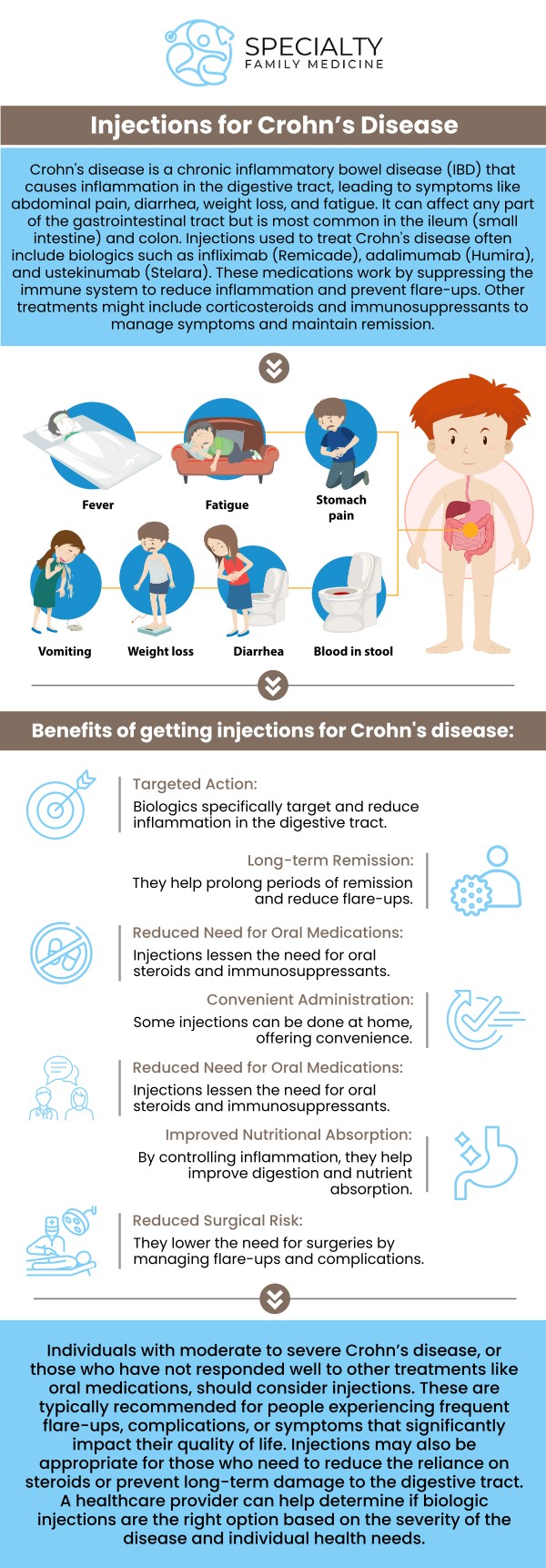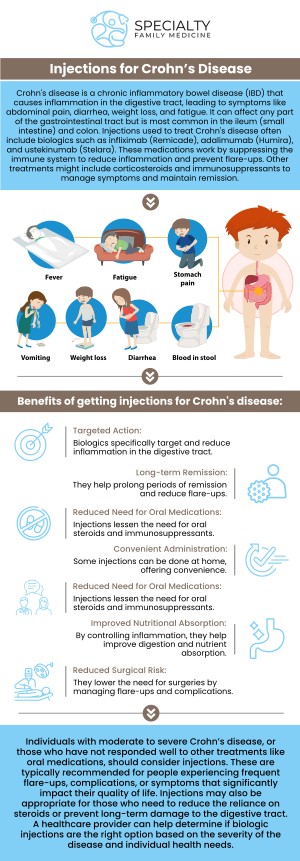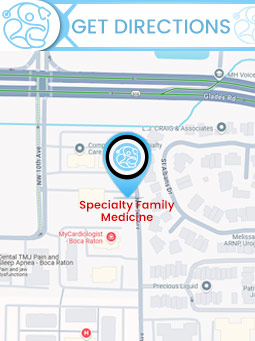Crohn’s Disease Doctor in Boca Raton, FL
Crohn’s disease is a chronic inflammatory condition that affects the digestive tract, causing pain, swelling, and discomfort. It leads to symptoms such as abdominal pain, chronic diarrhea, and weight loss. Patients may also experience fatigue, fever, and reduced appetite during flare-ups. At Specialty Family Medicine, Board-certified Dr. Ayokunle Fatade provides personalized care to manage symptoms and improve quality of life. For more information, contact us today or schedule an appointment online. We are conveniently located at 1599 NW 9th Ave, Suite 4, Boca Raton, FL 33486.


Table of Contents:
What is Crohn’s Disease?
What Causes Crohn’s Disease?
What Are the Symptoms of Crohn’s Disease?
How is Crohn’s Disease Diagnosed?
Experience Long-Term Crohn’s Disease Management at Specialty Family Medicine with Dr. Ayokunle Fatade in Boca Raton, FL
Crohn’s disease is a chronic inflammatory bowel disease (IBD) that causes inflammation and irritation in the digestive tract. It can affect any part of the gastrointestinal (GI) tract, from the mouth to the anus, but most commonly affects the small intestine and the beginning of the large intestine. The inflammation caused by Crohn’s disease can lead to thickening of the bowel wall, scarring, and narrowing of the intestine, making it difficult for food and waste to move through the digestive system. The exact cause of Crohn’s disease is not fully understood, but it is believed to be related to a combination of genetic, environmental, and immune system factors. Symptoms of Crohn’s disease can fluctuate, with periods of flare-ups followed by periods of remission. The disease is considered incurable, but treatment can help manage symptoms, reduce inflammation, and prevent complications.
The exact cause of Crohn’s disease is unknown, but several factors are believed to contribute to its development.
• Genetics: A family history of Crohn’s disease or other inflammatory bowel diseases increases the risk of developing the condition, suggesting a genetic predisposition.
• Immune System Dysfunction: Crohn’s disease is thought to be an autoimmune disorder in which the immune system mistakenly attacks the digestive tract. The immune response triggers chronic inflammation in the intestines.
• Environmental Factors: Certain environmental factors, such as diet, smoking, and living in industrialized countries, may contribute to the development of Crohn’s disease. Smoking is known to increase the risk and severity of the disease.
• Gut Microbiome: An imbalance in the bacteria in the gut may play a role in triggering the immune system response that leads to inflammation in the intestines.
While these factors contribute to the onset of Crohn’s disease, the precise cause remains complex and may differ from person to person.
Symptoms of Crohn’s disease can vary greatly depending on the severity and location of the inflammation in the digestive tract. Common symptoms include:
• Abdominal Pain and Cramping: Persistent pain or cramping, often in the lower right side of the abdomen, is a hallmark of the disease.
• Chronic Diarrhea: Frequent, loose stools are common, and in some cases, blood may be present in the stool.
• Fatigue: Constant tiredness and a general lack of energy, often due to malabsorption of nutrients or the body’s response to inflammation.
• Weight Loss: Unexplained weight loss which can result from poor nutrient absorption or loss of appetite.
• Fever: Mild to moderate fever may occur during flare-ups as the body responds to inflammation.
• Reduced Appetite: Nausea or a lack of interest in food can lead to reduced appetite.
• Rectal Bleeding: In more severe cases, ulcers can form in the intestines, leading to blood in the stool or anal fissures that can cause bleeding.
These symptoms can come and go in cycles, with flare-ups followed by periods of remission. If left untreated, Crohn’s disease can lead to complications such as bowel obstructions, fistulas, or abscesses.
Diagnosing Crohn’s disease involves several steps, including a review of medical history, physical exams, and various diagnostic tests.
• Medical History and Symptoms: The doctor will begin by discussing symptoms, family history, and any potential risk factors for inflammatory bowel diseases.
• Physical Examination: The doctor will check for signs of abdominal tenderness, weight loss, and malnutrition during the physical exam.
• Blood Tests: Blood tests can help detect signs of inflammation, anemia, or infection. High levels of certain markers, such as C-reactive protein (CRP), may indicate active inflammation.
• Stool Tests: Stool samples can help rule out infections and check for blood in the stool, which may indicate Crohn’s disease or another condition.
• Endoscopy or Colonoscopy: These procedures allow the doctor to examine the inside of the gastrointestinal tract. A colonoscopy can provide a detailed view of the colon and the last part of the small intestine, helping to detect inflammation, ulcers, and other abnormalities.
• Imaging Tests: MRI or CT scans can provide detailed images of the intestines, identifying areas of inflammation, strictures, or abscesses.
• Biopsy: In some cases, tissue samples may be taken during an endoscopy or colonoscopy to confirm the diagnosis and rule out other conditions.
Through these diagnostic methods, doctors can determine the presence of Crohn’s disease, its severity, and the best course of treatment.
At Specialty Family Medicine, we understand that managing Crohn’s disease requires a comprehensive and personalized approach. Led by board-certified Dr. Ayokunle Fatade, our team is committed to helping patients navigate the complexities of this chronic condition with the most up-to-date treatment options and compassionate care.
Tailored Treatment Plans for Long-Term Relief
Dr. Fatade’s expertise ensures that your treatment plan is tailored to your unique needs, aiming to alleviate symptoms, reduce inflammation, and improve overall quality of life. With a focus on both medical management and lifestyle adjustments, we provide ongoing support to help you live your life with confidence. Whether you’re managing flare-ups or seeking long-term care, Specialty Family Medicine is here to guide you every step of the way in Boca Raton, FL.
For more information, contact us today or schedule an appointment online. We are conveniently located at 1599 NW 9th Ave, Suite 4, Boca Raton, FL 33486. We serve patients from Boca Raton FL, Highland Beach FL, Lighthouse Point FL, Kings Point FL, Delray Beach FL, Deerfield Beach FL, Boynton Beach FL, and surrounding areas.

Additional Services You May Need

Additional Services You May Need
▸ Back Pain
▸ Neck Pain
▸ Neuropathy
▸ Arthritis
▸ Sciatica
▸ Chronic Pain
▸ Motor vehicle accident
▸ Crohn’s Disease
▸ Parkinsons
▸ Post Surgical Pain
▸ Headaches
▸ Migraines
▸ Achilles Pain
▸ Foot Pain
▸ Plantar Fasciitis
▸ Elbow Pain
▸ Tennis Elbow
▸ Joint Pain
▸ Shoulder Pain
▸ Irritable Bowel Syndrome
▸ Overweight/Obesity
▸ Chest Pain Syndrome
▸ Osteoporosis
▸ Endometriosis
▸ Menstrual Pain
▸ Rheumatoid Arthritis






